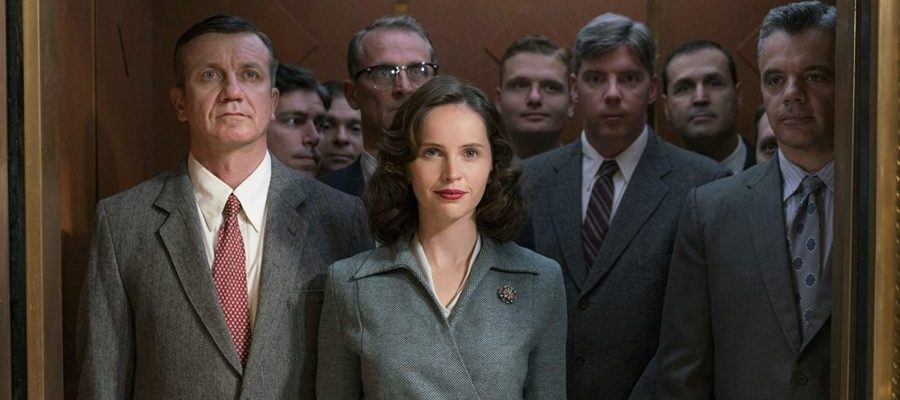Review: 'On the Basis of Sex' Shows What it Takes to Change a Nation

Michael Simon ‘19 / Emertainment Monthly Contributor
There is very little denying that Ruth Bader Ginsburg is a truly extraordinary person; the news stories one hears about her and the small windows that delve into her life as an 85-year-old Supreme Court Justice show the American people what a fierce advocate they have fighting on their behalf on the nation’s highest court. She is the kind of person where, if she were a fictional character in a film or a book, audiences might deem her “unrealistically heroic” or “unbelievably altruistic” simply because her actions are often so difficult to fathom in the best of ways. Exercising more at 85 than most young/middle-aged Americans? Back to work days after a fall that broke multiple ribs? Voting on decisions from a hospital bed shortly after receiving cancer treatment? Extraordinary to the point of being impossible to believe if we weren’t watching it unfold right in front of our eyes.
Justice Ginsburg is creating an inspiring and long-lasting legacy right now in real-time, so much so that any film about her would pale in comparison simply due to the fact that they must accurately recreate this larger-than-life person when we could just turn on the news and see her story for ourselves. However, despite the unevenness in this gargantuan task of moving Justice Ginsburg to the big screen, On the Basis of Sex excels by selling itself as a typical biopic but delivering a story of national change, the power of the people, and the necessity of flexibility in the institutions that surround us.

Now, the movie has two messages it is trying to tell, one clumsily blatant and the other perfectly subtle. The uniqueness of Ginsburg is no secret to the audience, and yet there are moments in the film where the plot stops so that she can deliver a very on-the-nose mini-monologue about her desire for progress or change in a way that just does not feel real, authentic, or natural. Maybe Justice Ginsburg is the type of person who pauses her day to make impassioned unplanned speeches, but for the purposes of this film, these scenes just did not work well.

Sometimes, the law is wrong, and change is not only welcome, but absolutely necessary. And in this specific line, the movie hints at the idea that perhaps the people put too much importance on the legal system, a system that can be flawed, immoral, or just outright wrong. We do not need laws to change in order to reinvent the country. The country has reinvented itself through a generational shift, and therefore the laws must change as a result of this. The institution of law ought to be changed to fit the times in which we exist, and while the country changes on its own through new voices and new opinions coming to the forefront, to change the law takes a bit more work. It takes a fierce advocate. It takes fearlessness. It takes an individual of extraordinary character.
It takes Supreme Court Justice Ruth Bader Ginsburg.
Overall Grade: A-
Watch The Trailer:
[embedyt] https://www.youtube.com/watch?v=28dHbIR_NB4[/embedyt]